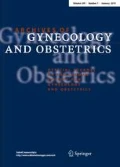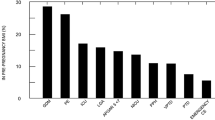Abstract
Purpose
compare incidences of maternal–fetal complications during pregnancy, labor, and early puerperium according to baseline BMI in a consecutive cohort of pregnant women.
Methods
This retrospective cohort study compares pregnancy outcome indicators by body mass index (BMI) in 1236 pregnant women managed over the period January 2017 to May 2018. Data were collected regarding the personal history (smoking, diabetes and hypertension), obstetrics and BMI (kg/m2) (normoweight 18.5–24.9, overweight 25–29.9, obese ≥ 30).
Results
Of the 1236 women, 354 (28.6%) were overweight and 206 (16.7%) were obese at the start of pregnancy follow-up. Mean age at this time was 33 years (SD 6). Risk factors for a cesarean-section delivery assessed through logistic regression were maternal age (OR 1.05 95% CI 2.06–6.15; p < 0.001) and previous C-section (OR 4.21 95% CI 2.89–6.14; p < 0.001) regardless of BMI. In a propensity score analysis, pregnancy weight gain was found lower in obese vs normoweight (− 2.73 kg 95% CI − 3.74 to − 1.72 p < 0.001), and newborn weight higher in obese vs normoweight women (161.21 g 95% CI 57.94–264.48 p = 0.002). Labor duration and weight gain were reduced in overweight vs normoweight subjects (− 0.72 h 95% CI − 1.27 to − 0.17 p = 0.010 and 0.81 kg 95% CI − 1.50 to − 0.12 p = 0.021, respectively).
Conclusions
In this cohort, obese women showed higher rates of prenatal complications yet obesity and overweight were not related to worse puerperium outcomes.

Similar content being viewed by others
References
Moreno M (2012) Definición y clasificación de la obesidad. Rev Med Clin Condes 23(2):124–128. https://doi.org/10.1016/S0716-8640(12)70288-2
Instituto Nacional de Estadística (2017) Encuesta Nacional de Salud España 2017. Ministerio de Sanidad, Consumo y Bienestar Social. https://www.mscbs.gob.es/estadEstudios/estadisticas/encuestaNacional/encuestaNac2017/ENSE2017_notatecnica.pdf. Accessed 1 October 2019
Santos S, Voerman E, Amiano P, Barros H, Beilin LJ, Bergström A et al (2019) Impact of maternal body mass index and gestational weight gain on pregnancy complications: an individual participant data meta-analysis of European. North Am Aust Cohort BJOG 126(8):984–995. https://doi.org/10.1111/1471-0528.15661
Lisonkova S, Muraca GM, Potts J, Liauw J, Chan WS, Skoll A et al (2017) Association between prepregnancy body mass index and severe maternal morbidity. JAMA 318(18):1777–1786. https://doi.org/10.1001/jama.2017.16191
ACOG (2015) Practice bulletin no 156: obesity in pregnancy. Obstet Gynecol 126:e112
He XJ, Dai RX, Hu CL (2020) Maternal prepregnancy overweight and obesity and the risk of preeclampsia: a meta-analysis of cohort studies. Obes Res Clin Pract 14:27–33. https://doi.org/10.1016/j.orcp.2020.01.004
Torloni MR, Betrán AP, Horta BL, Nakamura MU, Atallah AN, Moron AF et al (2009) Prepregnancy BMI and the risk of gestational diabetes: a systematic review of the literature with meta-analysis. Obes Rev 10(2):194–203. https://doi.org/10.1111/j.1467-789X.2008.00541.x
Heslehurst N, Vieira R, Hayes L, Crowe L, Jones D, Robalino S et al (2017) Maternal body mass index and post-term birth: a systematic review and meta-analysis. Obes Rev 18(3):293–308. https://doi.org/10.1111/obr.12489
Mohammadi M, Maroufizadeh S, Omani-Samani R, Almasti-Hashiani A, Amini P (2019) The effect of prepregnancy body mass index on birth weight, preterm birth, cesarean section, and preeclampsia in pregnant woman. J Matern Fetal Neonatal Med 32(22):3818–3823. https://doi.org/10.1080/14767058.2018.1473366
Chu SY, Bachman DJ, Callaghan WM, Whitlock EP, Dietz PM, Berg CJ et al (2008) Association between obesity during pregnancy and increased use of health care. N Engl J Med 358(14):1444–1453. https://doi.org/10.1056/NEJMoa0706786
Marchi J, Berg M, Dencker A, Olander EK, Begley C (2015) Risks associated with obesity in pregnancy for the mother and baby: a systematic review of reviews. Obes Rev 16(8):621–638. https://doi.org/10.1111/obr.12288
Godfrey KM, Reynold RM, Prescott SL, Nyirenda M, Jaddoe VW, Erisksson JG et al (2017) Influence of maternal obesity on the long-term health of offspring. Lancet Diabetes Endocrinol 5(1):53–64. https://doi.org/10.1016/S2213-8587(16)30107-3
Alves P, Malheiro MF, Gomes JC, Ferraz T, Montenegro N (2019) Risks of maternal obesity in pregnancy: a case-control study in a Portuguese obstetrical population. Rev Bras Ginecol Obstet 41(12):682–687. https://doi.org/10.1055/s-0039-3400455
Shaukat S, Nur U (2019) Effect of prepregnancy maternal BMI on adverse pregnancy and neonatal outcomes: results from a retrospective cohort study of a multiethnic population in Qatar. BMJ Open 9:e029757. https://doi.org/10.1136/bmjopen-2019-029757
Rodríguez-Mesa N, Robles-Benayas P, Rodríguez-López Y, Pérez-Fernández EM, Cobo-Cuenca AI (2019) Influence of body mass index on gestation and delivery in nulliparous women: a cohort study. Int J Environ Res Public Health 16(11):2015. https://doi.org/10.3390/ijerph16112015
Simko M, Totka A, Vondrova D, Samohyl M, Jurkovicova J, Trnka M et al (2019) Maternal body mass index and gestational weight gain and their association with pregnancy complications and perinatal conditions. Int J Environ Res Public Health 16(10):1751. https://doi.org/10.3390/ijerph16101751
Melchor I, Burgos J, del Campo A, Aiartzaguena A, Gutiérrez J, Melchor JC (2019) Effect of maternal obesity on pregnancy outcomes in women delivering singleton babies: a historical cohort study. J Perinatal Med 47:625–630. https://doi.org/10.1515/jpm-2019-0103
Doi L, William AJ, Marrayat L et al (2020) Cohort study of high maternal body mass index and the risk of adverse pregnancy and delivery outcomes in Scotland. BMJ Open 10:e026168. https://doi.org/10.1136/bmjopen-2018-026168
Brenes-Monge A, Saavedra-Avendaño B, Alcalde-Rabanal J, Darney BG (2019) Are overweight and obesity associated with increased risk of cesarean delivery in Mexico? A cross-sectional study from the National Survey of Health and Nutrition. BMC Pregnancy Chilbirth 19:239. https://doi.org/10.1186/s12884-019-2393-5
Ratnasiri AWG, Lee HC, Lakshminrusimha S, Parry SS, Arief VN, DeLacy IH et al (2019) Trends in maternal prepregnancy body mass index (BMI) and its association with birth and maternal outcomes in California. 2007-2016: A retrospective cohort study. PLoS One 14(9):e0222458. https://doi.org/10.1371/journal.pone.0222458
Eden KB, McDonagh M, Denman MA, Marshall N, Emeis C, Fu R et al (2010) New insights on vaginal birth after Cesarean: can it be predicted? Obstet Gynecol 116(4):967–981. https://doi.org/10.1097/AOG.0b013e3181f2de49
Fallatah AM, Babatin HM, Nassibi KM, Banweer MK, Fanyoumi MN, Oraif AM (2019) Maternal and neonatal outcomes among obese pregnant women in King Abdulaziz University Hospital: a retrospective single-centre medical record review. Med Arch 73(6):425–432. https://doi.org/10.5455/medarh.2019.73.425-432
Chen CN, Chen HS, Hsu HC (2020) Maternal prepregnancy body mass index, gestational weight gain, and risk of adverse perinatal outcomes in Taiwan: a population-based birth cohort study. Int J Environ Res Public Health 17(4):1221. https://doi.org/10.3390/ijerph17041221
Liu L, Wang H, Zhang Y, Niu J, Li Z, Tang R (2020) Effect of pregravid obesity on perinatal outcomes in singleton pregnancies following in vitro fertilization and the weight-loss goals to reduce the risks of pregnancy outcomes: a retrospective cohort study. PLoS ONE 15(2):e0227766. https://doi.org/10.1371/journal.pone.0227766
Goldstein RF, Abell SK, Ranasinha S, Misso M, Boyle JA, Black MH et al (2017) Association of gestational weight gain with maternal and infant outcomes: a systematic review and meta-analysis. JAMA 317(21):2207–2225. https://doi.org/10.1001/jama.2017.3635
Zhao RF, Zhou L, Zhang WF (2019) Identifying appropriate pre-pregnancy body mass index classification to improve pregnancy outcomes in women of childbearing age in Beijing, China: a retrospective cohort study. Asia Pac J Clin Nutr 28(3):567–576. https://doi.org/10.6133/apjcn.201909_28(3).0016
Acknowledgements
The authors thank Cristina Fernández Pérez PhMD, from the Preventive Medicine and Public Health Department of the University Hospital of Santiago de Compostela, for designing the statistical approach used.
Funding
This research received no external funding.
Author information
Authors and Affiliations
Contributions
All authors contributed to the study conception and design. Otero-Naveiro A was responsible of: protocol development, data collection, data analysis, manuscript writing, manuscript editing. Gómez-Fernández C was responsible of: protocol development, data collection, data analysis, manuscript writing, manuscript editing. Álvarez-Fernández R was responsible of: protocol development, manuscript review, supervision, project administration. Pérez-López M was responsible of: protocol development, manuscript review, manuscript editing. Paz-Fernández E was responsible of: manuscript review, supervision, project administration. All authors read and approved the final manuscript.
Corresponding author
Ethics declarations
Conflicts of interest
The authors declare that they have no conflict of interest.
Ethics approval
The study was conducted in accordance with the Declaration of Helsinki, and the protocol was approved by the Ethics Committee of Santiago-Lugo on November 17th 2020 (registration code: 2020/541).
Informed consent
Not required. This is a retrospective study conducted on already available data. All information is anonymized and the submission does not include images that may identify the person.
Additional information
Publisher's Note
Springer Nature remains neutral with regard to jurisdictional claims in published maps and institutional affiliations.
Rights and permissions
About this article
Cite this article
Otero-Naveiro, A., Gómez-Fernández, C., Álvarez-Fernández, R. et al. Maternal and fetal outcomes during pregnancy and puerperium in obese and overweight pregnant women. A cohort study. Arch Gynecol Obstet 304, 1205–1212 (2021). https://doi.org/10.1007/s00404-021-06059-x
Received:
Accepted:
Published:
Issue Date:
DOI: https://doi.org/10.1007/s00404-021-06059-x




